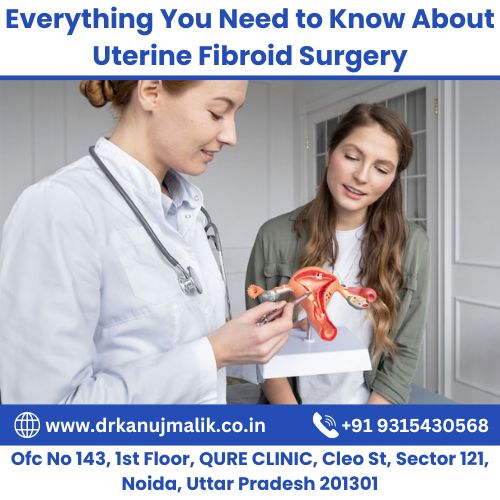Uterine fibroids are non-cancerous growths that develop in or around the uterus, affecting up to 70% of women by the age of 50.
While many fibroids are asymptomatic and may not require treatment, some can cause significant symptoms such as heavy menstrual bleeding, pelvic pain, frequent urination, and fertility problems. In such cases, surgical intervention may be the best course of action.
This blog provides a comprehensive overview of uterine fibroid surgery — what it is, when it’s necessary, and what patients can expect.
What Are Uterine Fibroids?
Uterine fibroids, also called leiomyomas or myomas, are composed of muscle and fibrous tissue. They vary in size and may grow on the inside, outside, or within the wall of the uterus.
Although the exact cause is unknown, factors like hormones (especially estrogen), genetics, and age contribute to their development.

When Is Surgery Needed?
While many fibroids are managed through medications or non-invasive procedures, surgery becomes essential when:
- Fibroids are large and causing severe pain or pressure.
- Menstrual bleeding is heavy and prolonged.
- The patient is experiencing infertility or recurrent miscarriages.
- Other treatments have failed to provide relief.
A surgical option can significantly improve quality of life and reproductive outcomes, especially in women planning to conceive.
Types of Uterine Fibroid Surgery
There are several surgical methods for treating uterine fibroids. The choice depends on the size, number, and location of the fibroids, as well as the patient’s overall health and fertility goals.
1. Myomectomy
This is a fibroid removal surgery that preserves the uterus, making it a preferred option for women who wish to retain fertility. It can be performed in three ways:
- Hysteroscopic Myomectomy: For fibroids inside the uterine cavity.
- Laparoscopic Myomectomy: Minimally invasive and ideal for fewer or smaller fibroids.
- Abdominal Myomectomy: Open surgery, usually for larger or multiple fibroids.
2. Hysterectomy
A hysterectomy involves the complete removal of the uterus and is the only permanent solution for uterine fibroids. It is generally recommended for women who are past childbearing age or have very large or recurrent fibroids.
While effective, this procedure comes with longer recovery times and permanent infertility.
3. Uterine Artery Embolization (UAE)
Although not a surgery in the traditional sense, UAE is a minimally invasive procedure that blocks the blood supply to fibroids, causing them to shrink.
It’s a good option for those seeking an alternative to surgery, but it may not be suitable for all patients, especially those wishing to become pregnant in the future.
Recovery and Aftercare
Recovery time depends on the type of surgery:
- Hysteroscopic Myomectomy: 1–2 weeks
- Laparoscopic Myomectomy: 2–4 weeks
- Abdominal Myomectomy or Hysterectomy: 4–6 weeks
Post-surgical care includes rest, avoiding strenuous activity, managing pain, and following up with your healthcare provider. Regular monitoring ensures that complications like infections, bleeding, or fibroid recurrence are identified early.
Risks and Complications
Like any surgical procedure, uterine fibroid surgery comes with risks such as:
- Excessive bleeding
- Infections
- Damage to surrounding organs
- Adhesions or scar tissue
- Fertility challenges (especially with hysterectomy)
Choosing an experienced surgeon can significantly minimize these risks and improve outcomes.
Meet Dr. Kanuj Malik For Fibroid Surgery
When it comes to fibroid surgery, expertise matters. Dr. Kanuj Malik, a highly experienced surgical oncologist with 14 years of expertise, has earned a strong reputation for delivering excellent patient outcomes.
Known for his precision, compassion, and commitment to advanced surgical techniques, Dr. Kanuj Malik has helped hundreds of women regain control over their health through successful fibroid management.
He stays at the forefront of gynecologic oncology and minimally invasive surgical methods, ensuring that patients receive the most appropriate and personalized care.
If you are looking for an experienced professional who understands the nuances of uterine fibroid surgery and values patient comfort and safety, Dr. Kanuj Malik is a trusted name in the field.
Choosing the Right Specialist
While fibroids are benign, their symptoms can overlap with more serious conditions like uterine or ovarian cancer. That’s why early diagnosis and expert evaluation are crucial.
A skilled Uterus cancer specialist in Noida can distinguish between benign and malignant conditions and recommend the most effective treatment plan.
Dr. Kanuj Malik also works closely with gynecologists and radiologists to ensure a multidisciplinary approach to patient care, especially in complex or high-risk cases. As a Uterus cancer specialist in Noida, he brings both surgical expertise and oncological insight to ensure that no underlying condition goes unnoticed.
Conclusion
Uterine fibroid surgery can be life-changing for women suffering from severe symptoms. With the right diagnosis, surgical approach, and aftercare, most patients experience substantial relief and improved quality of life.
If you’re considering surgery for fibroids, don’t hesitate to consult a trusted expert like Dr. Kanuj Malik to guide you through the process with compassion and precision.
Qure Clinic
Address – Shop No 143 1st floor, Cleo Street, near CLEO COUNTY, Sector 121, Noida, Uttar Pradesh, 201301
Email – kanujmalik03@rediff.com
Phone – +91 9315430568
Monday To Saturday – 9:00AM–9:00PM
Sunday closed
Google Map Location Listing – https://g.co/kgs/BfrTkmW
